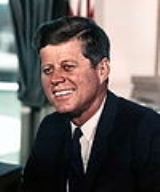
in 1963.
After military service as commander of the Motor Torpedo Boats
PT-109
and PT-59
during World War II
in the South Pacific
, Kennedy represented Massachusetts's 11th congressional district
in the U.S. House of Representatives
from 1947 to 1953 as a Democrat
.
1943 World War II: the Motor Torpedo Boat PT-109 is rammed by the Japanese destroyer ''Amagiri'' and sinks. Lt. John F. Kennedy, future U.S. President, saves all but two of his crew.
1960 In Chicago, the first televised debate takes place between presidential candidates Richard M. Nixon and John F. Kennedy.
1960 While campaigning for President of the United States, John F. Kennedy announces his idea of the Peace Corps.
1960 Robert McNamara is named president of Ford Motor Co., the first non-Ford to serve in that post. A month later, he quit to join the newly-elected John F. Kennedy administration.
1960 Richard Paul Pavlick is arrested for attempting to blow up and assassinate the U.S. President-Elect, John F. Kennedy only four days earlier.
1961 John F. Kennedy is inaugurated as the youngest elected and first Roman Catholic President of the U.S. His inaugural address is one of the most memorable of the 20th century.
1961 In Washington, D.C. John F. Kennedy delivers the first live presidential television news conference.
1961 John F. Kennedy appoints Janet G. Travell to be his physician. This is the first time a woman holds this appointment.
1961 President of the United States John F. Kennedy establishes the Peace Corps.
1961 Apollo program: U.S. President John F. Kennedy announces before a special joint session of the Congress his goal to initiate a project to put a "man on the Moon" before the end of the decade.
The voters selected us, in short, because they had confidence in our judgement and our ability to excercise that judgement from a position where we could determine what were their own best interest, as a part of the nation's interest. ![]()
A man does what he must — in spite of personal consequences, in spite of obstacles and dangers, and pressures — and that is the basis of all human morality.![]()
The Chinese use two brush strokes to write the word "crisis". One brush stroke stands for danger; the other for opportunity. In a crisis, be aware of the danger — but recognize the opportunity.![]()
The New Frontier of which I speak is not a set of promises — it is a set of challenges. It sums up not what I intend to offer the American people, but what I intend to ask of them.![]()
Their platform, made up of left-over Democratic planks, has the courage of our old convictions. Their pledge is a pledge to the status quo — and today there can be no status quo.
![]()

